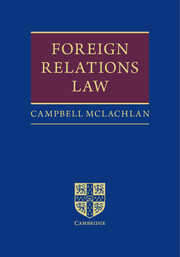'Questions concerning the role of international law before national courts are confronting the courts with constitutional problems as profound as any that have arisen during the past 200 years. This masterly study, by an eminent practitioner and academic, offers both an incisive analysis of the problems and a subtle and precise approach to a solution based upon the methodologies of private international law. It is an outstanding study, carrying the torch of Hersch Lauterpacht and Francis Mann into a new century and a very different world.'
Vaughan Lowe, QC - Emeritus Chichele Professor of Public International Law, University of Oxford
'This is the most important study of the foreign relations law of the UK and cognate jurisdictions since F. A. Mann's work of 1986. Moreover, there is much more to study, given the torrent of litigation in this field in the past fifteen years. Campbell McLachlan's account combines the finesse of a scholar and the insight of a practitioner. It is essential reading for anyone dealing with its subject.'
James Crawford, SC, FBA - Whewell Professor of International Law, University of Cambridge
'In the early twenty-first century the relationship between international law and domestic law has assumed a greater importance than ever before, in fields as diverse as commercial transactions, environmental regulation and the protection of human rights. Anyone with an interest in the subject will find Professor McLachlan's book a most stimulating contribution to this discussion.'
The Hon. Mr Justice Singh - Presiding Judge of the South Eastern Circuit, Royal Courts of Justice
'It is that combination of comprehensive scope and analytical precision … that makes the work as a whole stand out in quality from anything that has gone before … It deserves to be the leading authority in the field, as it undoubtedly will be.'
Sir Franklin Berman, QC
Source: Law Quarterly Review
'[A] magisterial analysis not only of the historical background against which questions of foreign relations law today fall to be settled, but also against a broad jurisdictional canvas.'
Eirik Bjorge
Source: The British Yearbook of International Law
'[A] superb exercise in building an integrated whole out of the seemingly disparate parts of foreign relations law.'
Joost Blom
Source: Netherlands International Law Review
'[T]he book’s particular strength is in coherently bringing together the different concerns of constitutional law, public international law, and - to a lesser extent - the conflicts of law, in presenting a modern treatise on the law governing foreign relations. This is where McLachlan makes an important and excellent contribution to the academic literature, which has for many years lacked a study of this kind.'
Paul Mora
Source: Asian Journal of International Law
'[A] very remarkable contribution to legal knowledge … The depth of arguments and quality of analytical comparisons truly portray a decade of reflections.'
Pontian Okoli
Source: Commonwealth Law Bulletin
'McLachlan uses as an epigraph Lord Bridge’s dictum in Ex parte Bennett [1994] 1 AC 42, 67, that ‘[t]o hold that the court may turn a blind eye to executive lawlessness beyond the frontiers of its own jurisdiction is, to my mind, an insular and unacceptable view’, and in his book gives an extremely attractive account of why this ought to be so in principle, as well as analytically chronicling the development that Anglo-Commonwealth law has undergone in order to arrive at this position.'
Eirik Bjorge
Source: British Yearbook of International Law





